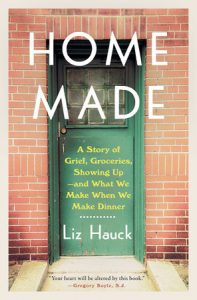A book by UW–Madison’s Elizabeth Hauck, a doctoral student in educational policy studies and history, was reviewed by the New York Times.
 Hauck’s book, titled “Home Made: A Story of Grief, Groceries, Showing Up — and What We Make When We Make Dinner,” is a memoir about the years she spent running a once-a-week cooking club at “The House,” the Boston residential home for adolescent boys in state care that Hauck’s father had co-directed for much of her life.
Hauck’s book, titled “Home Made: A Story of Grief, Groceries, Showing Up — and What We Make When We Make Dinner,” is a memoir about the years she spent running a once-a-week cooking club at “The House,” the Boston residential home for adolescent boys in state care that Hauck’s father had co-directed for much of her life.
Hauck had initially planned to help her father run the club, but when he died following a brief illness, she decided to go ahead with the idea anyway: “I would never make another meal with my dad, but cooking at the House with his other kids like we’d talked about would be a kind of final nod to him, an offering,” she writes.
Explains the New York Times review:
Hauck never sugarcoats the difficulties of the boys’ lives and the bare-bones institutional shabbiness of the House. Because she writes with such unvarnished clarity and pragmatism, sudden moments of tenderness burst open on the page, as when one of the boys affectionately calls her “dawg,” or when she learns they loved the Christmas presents she carefully picked out for them.
Still, there’s no redemption in this story, no overcoming of adversity, and no feel-good happy ending. “Books are supposed to have calibrated worlds and endings that make sense, where heroes you root for don’t die, and boys whom you meet in the beginning — the ones who make jokes while cutting chicken and help to feed other people and keep showing up to do it again — get to be heroes by the end of the story. This book doesn’t make that kind of sense.”
But it does make another, far more powerful kind of sense. “We know that systems fail, but food is revolutionary,” Hauck writes. “When in doubt, we focus on the food.” Her focus throughout the book stays on the boys themselves, and her gratitude toward them for welcoming her into their house. It turns out that showing up to cook and eat with people once a week allows for startlingly deep moments of connection and community. That’s all that happens. And it’s extraordinary.